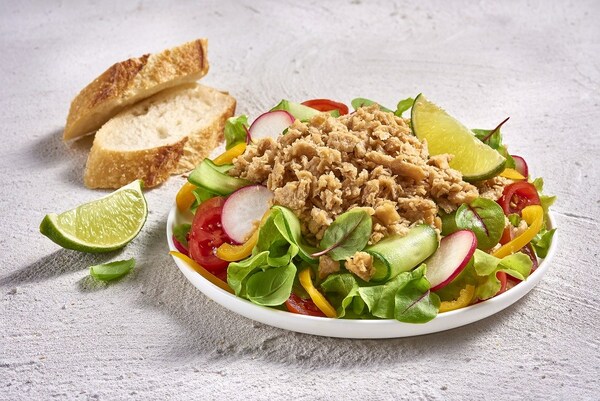Israeli food tech company Vgarden recently announced the launch of its plant-based tuna alternative for the global business-to-business (B2B) food market. The canned vegan tuna has the same appearance, texture, aroma and flavor as its canned fish counterpart, but without the fins or scales, according to Vgarden.
Plant-Based Tuna for the Planet
“Tinned tuna has a very distinct flaky, yet moist and chewy texture, with a powerful fresh-from-the sea aroma,” said Ilan Adut, CEO of Vgarden, in a press release. “Our new tuna-like product is clean-label, scalable, affordable and sustainable. But for our plant-based creation to serve as a true substitute, even beyond compellingly mimicking all of the sensory qualities, it also has to match tuna as much as possible in nutritional value.”
The plant-based tuna — which is made with water, sunflower oil, pea protein, nutritional fibers, flavor, salt and food color — was created to satisfy the demand for sustainably-made food products. The tuna analog was Vgarden’s response to the issues of overfishing and the rapidly declining ocean populations of wild tuna.
Related: Israeli Startup Plantish Debuts Whole-Cut Plant-Based Salmon Filets
While traditional canned tuna is a cheap and popular source of protein that can be conveniently stored without refrigeration, tuna is the world’s most consumed fish. This has led to the overfishing of various species, such as the yellowfin tuna and the Atlantic bluefin tuna, to the edge of extinction. With the global tuna fish market projected to reach $49.70 billion by 2029, Vgarden said its plant-based tuna will be a “game changer” for sustainability-driven consumers.
Pea Protein In, Plastics Out
After 12 months of research and development (R&D), Vgarden’s team developed a plant-based tuna formula using pea protein, fibers and sunflower oil, which offers an 11.2 to 14 percent protein content and 321 calories per 100 grams. While traditional canned tuna contains around 120 calories and 25 grams of protein in the same serving size, Vgarden’s tuna is free of microplastics, mercury and cholesterol.
One major benefit of Vgarden’s plant-based tuna is that it contains no toxic metals or other ocean pollutants. Its proprietary manufacturing process uses only minimal energy consumption and water, and the company is also working to fortify its novel tuna with omega-3 fatty acids.
The private-label product is already being rolled out in the retail and foodservice sectors. It is available in two packaging formats: pouches for chilled storage and actual tins to give the authentic tuna experience and facilitate non-chilled storage. Vgarden wanted to develop a plant-based tuna that could be canned and sterilized at high temperatures yet retain its full flavor and texture.
Vgarden’s Portfolio
Vgarden’s plant-based tuna is its first product in the vegan fish category. The company is already in the final stages of developing four more products in the fish alternatives space, which the company expects to announce by the end of this year.
Meanwhile, Vgarden’s portfolio provides the plant-based food market with various alternative products, including vegan hard cheeses, spreads, pastries, nuggets, meats and now, fish. Its products are sold across Israel under its popular MashuMashu brand as well as in Asia, Australia and Canada.
Last year, the company partnered with microalgae specialist Brevel to make a high-protein microalgae cheese that will be introduced to global markets in 2023.












Join or login to leave a comment
JOIN LOGIN